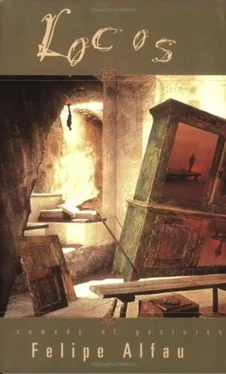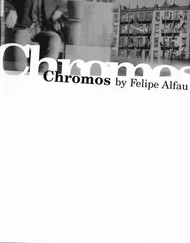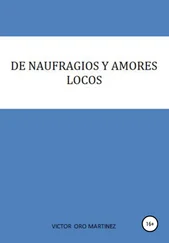The man tried to shrink from Pepe’s grip, but the latter held him by the collar.
“Give me the wallet,” Pepe shouted.
The other one did not wait for the request to be repeated. He produced the wallet and handed it over.
“You scoundrel,” Pepe said. “For this time I will let you go with this,” and he delivered a most devastating kick that landed on the other man’s buttocks. At that moment a clock struck two o’clock.
Pepe heard the man running away and laughed:
“A skillful pickpocket but a poor bandit,” and walked back to his casa de huespedes feeling rather proud of himself.
When he arrived at his room, Pepe proceeded to examine the contents of his wallet to make sure that nothing was missing. He was naturally greatly surprised (by far more surprised than the reader) at finding that the wallet was not his.
He turned it about to find some way of identifying it. It contained no personal cards, not even a monogram. Its only contents, which in those days of general thievery should have been the most important, were several bank notes to the value of five hundred pesetas.
Well, it was a strange situation. Here he had held up some innocent victim. He had turned into a holdup man. Was the influence of those days forcing itself into people’s actions? Was Madrid wrapping him in its dark circumstances in order to turn him into a crook, like everybody else? Pepe laughed. No, he was an honest person and would not be tempted. The next day he was going to take the wallet to his uncle, should anybody claim it, a remote possibility in those days of skepticism.
But then again, what had become of his wallet? Someone had stolen it for sure. Was this a way in which Providence was compensating him? Was this a law of compensation which had descended upon Madrid to defend its inhabitants, when the police could not or cared not to perform its duty? This wallet contained twice as much money as his own. It was only just to keep half of it and return the other half, leaving it to this palpable Providence, whose existence was more than manifest, to compensate the owner of the wallet.
But no, Madrid, strong as it was in demoralizing people, could not eradicate so quickly the influence of so many years spent in England, and he had already argued the point with himself. It was too late. If he had only taken for granted that the wallet was his, as he had believed when he received it, it would have been all right. He could have spent the money without looking at the wallet, without admitting to himself that it was not his own (a gentleman may not be aware of the money he has). This would have been perfectly correct even in England. But now it was too late. He knew that the wallet did not belong to him. He had admitted it almost aloud even in the loneliness of his room. His only witness had been his blurred reflection in a mirror by the dim candlelight. But that was enough. Now he had to return the wallet. And Pepe, thinking how low his own funds were at the moment, wished he had never been to England.
He went to bed. He slept. In the morning he woke up and performed his ablutions, after having filled the basin that stood in the corner with cold water. The absence of hot water was annoying him. Also the absence of a bathtub. True enough, there was a tub at the other end of the passage, but it had only cold water and it was necessary to heat a tremendous amount of water to fill it. He had not realized until then how much hot water one really used in one’s bath. Pepe decided to be patriotic and not take a bath, which after all cost one peseta. The peseta bounced in his brain and found its echo in the things he had heard the night before. For one peseta there was a Lunarito, perhaps more than one, in Madrid, who showed a beauty spot. The same amount that it cost to take a bath. Undoubtedly the Spaniards had a most astonishing sense of proportion. He poured some cold water over these thoughts and grumbled again. He was compensated a little later by the maid who brought him excellent chocolate with churros .
The maid who brought the breakfast was a twelve-year-old girl, overdeveloped even for Spain’s standards of puberty. The short childish dress she wore and the socks rising from high-heeled shoes and clinging to a superbly solid pair of legs gave her an exceedingly provocative air.
Pepe saw her in the mirror. He imagined in the pronounced curve of her breasts and hips a mineralitic hardness which was communicated to him. He scented the firm youthful flesh and turned to find her looking at the opened coat of his pajamas, which exposed a hairy chest. The girl’s eyes rested upon that emblem of manliness as she laid the tray with the breakfast on a chair. Pepe felt sure that he had aroused her feminine admiration. His Spanish characteristics were pushing their way out in him. He put his hands on his hips opening his pajama coat farther. There was a most persistent tremor in his throat and a certain oppression on his solar plexus. To hide this, for some people think that even in the most crudely carnal situations one must not show one’s wishes too openly, if one is to attain these wishes, he did something surprisingly innocent, which showed how little he really knew about Spain. He took the towel from his shoulder and holding it open with both hands in front of him, he looked at the girl and shouted:
‘‘ Huh, toro. “ And whirling the towel as if it were a cloak, he finished: ‘‘ Ole! “
Had it not been for his words, his attire was so inappropriate and his style so poor even before such a charming young bull that it could not have been recognized. The girl, however, gave signs of indisputable sagacity. Always looking at his chest as if hypnotized by it, she bent forward with arms outstretched in front and charged in true bull manner. Pepe, like a real torero , did not move, he just turned a little and held her in his arms. Her face rested upon his naked chest and her nostrils quivered among the abundant hair.
Well, when Pepe left the casa de huespedes after having swallowed his cold chocolate, he was thinking of how a mere infant in Spain could teach a full-grown man so many new things. The morning was splendid, one of those typical mornings of Madrid, gay, merry, noisy and ill-smelling, sprinkled with peddlers and vendors voicing and singing their merchandise:
‘‘El florero.! Clavelitos, quien me compra claveles.?”
‘‘El afilador. ”
‘‘Cerezas por hierro viejo. ”
Pepe observed that the man who was selling cherries in exchange for old iron had no more cherries left but that he continued nevertheless to voice a merchandise which did not exist. The man had accustomed his lungs to this periodical yell and if he did not let it out, he would probably explode. Pepe began to think how such a man could sleep without suddenly awaking himself with his cries, but he was interrupted in his thoughts by a beggar who accosted him.
‘‘Caballero, una limosnita por amor de Dios. “
The man had a most studied meek attitude and his appearance was ragged beyond description. He portrayed misery as one can find it only in Latin countries, if I must say so myself.
Pepe inquired:
“What is your name?”
“Laureano Baez pa servirle caballero.”
Pepe felt happy and generous this morning and he gave the limosnita .
“Dios se lo pague ,“ the beggar said, heading for another person, and Pepe thought that for once God had already paid that morning. For a flashing moment his happiness was clouded with heavy pity for this country of his, for the endless misery and poverty he had encountered since he crossed the Pyrenees. This cloud was soon dissipated by the fragrance of a violet a girl was pinning on his lapel. Pepe who felt chatty and inquisitive that morning inquired, tilting his hat backwards and spinning his stick in his fingers as true Madrileños do under such circumstances:
Читать дальше












